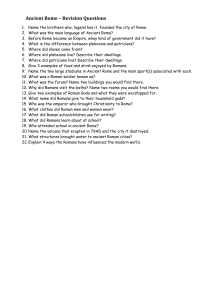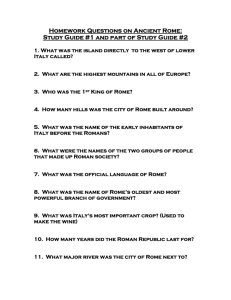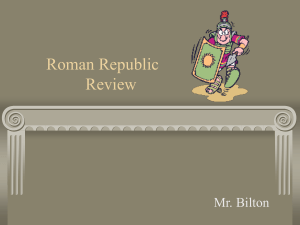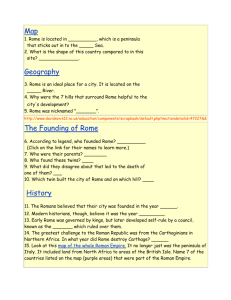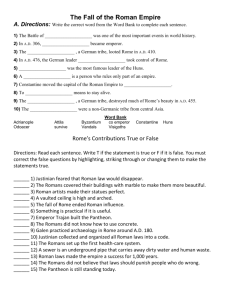Student Growth Objective TEST
advertisement
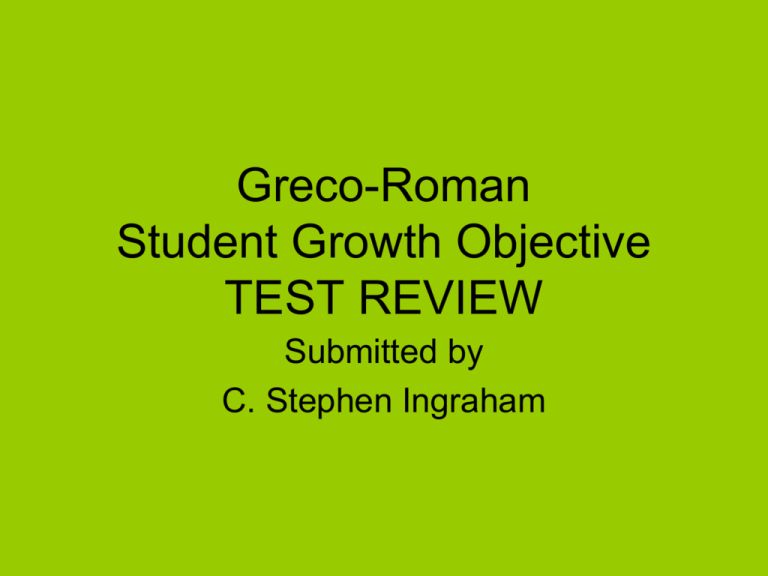
Greco-Roman Student Growth Objective TEST REVIEW Submitted by C. Stephen Ingraham Greco-Roman Song You take the Minoans / On the island of Crete They were seafaring traders / They were peaceful and sweet They traded olive oil, wool, and pottery. That’s what they’re all about! –(clap). Chorus: Tragedies are serious Comedies are humorous, Democracy is for us, Greek culture is all about us! -(Clap, Clap). You take the Mycenaeans / On the mountainous peloponnesus They were a warlike people / Their wealth was a weapon census. They borrowed writing, customs, and religious beliefs. When they invaded Crete. –(clap). They tell of Homer’s epic poem / about the beautiful Helen, Who was kidnapped to Troy / all the Greeks started yelling. They fought for ten years, then tried the Trojan horse trick That’s the only way they could win. –(clap). The city-state of Sparta / was afraid of their slaves. So at seven boys & girls / left for camp with many a waves To live and die with honor was the Spartan way Obedience is what it’s all about. –(clap). Chorus: Tragedies are serious Comedies are humorous, Democracy is for us, Greek culture is all about us! -(Clap, Clap). In the city-state of Athens / 20 year old males could vote, But no women or slaves. / They could only carry and tote. Democracy, majority rule, Pericles, and Herodotus. Hippocrates says illness is all about us. –(clap). The Persians set out / to conquer everything in sight, But the Greeks wouldn’t give up / and united for a fight. Both Darius and son, Xerxes both did try. Many Persians had to die. –(clap). Alexander’s father died / so Macedonia wasn’t so great. To conquer the known world / would be Alexander’s fate. Around the Mediterranean he never lost a battle. Spreading Greek culture all about. –(clap) The Patricians founded Rome along the Tiber river on the Italian peninsula. They elected Senators Who elected two consuls And in case of emergency And appointed a dictator for everyone to see. Chorus: Oh Roman artists copy Greek Philosophy, writing, and art The Greek and the Roman gods you can’t tell them apart. Gladiators fight to the death while all the Romans cheer. Aqueducts will bring in water if no water’s near. The Patricians excluded the Plebeians, but after they threaten to leave, the Plebeians elected ten tribunes, who had the veto power. Julius Caesar tried to help the poor, but the Senate stabbed him in the back. Even his best friend, Oh what do you think of that? Greco-Roman Song Octavian and Mark Antony Divide up the Roman empire, but Cleopatra loved Mark Antony and they decided to set up their own kingdom. Octavian became Augustus after defeating them. He was Rome’s first Emperor, but the citizens still thought they had a Republic. Chorus: Oh Roman artists copy Greek Philosophy, writing, and art The Greek and the Roman gods you can’t tell them apart. Gladiators fight to the death while all the Romans cheer. Aqueducts will bring in water if no water’s near. Some Hebrews thought that Jesus was the messiah. He said he was God’s son; His kingdom it would come. The twelve apostles and St. Paul spread the good news He had to say. Constantine painted crosses on his shields and Christianity saved the day!!! Greco-Roman Song Greco-Roman Five Minute Assessment (Greece) 1.__ In both the governments in Greece & Rome who were excluded from participation and citizenship? a) criminal & slaves b) Phoenicians and Persians c) women and slaves d) Christians and Jews. 2. __ Who finally was able to unite the fiercely independent Greek city-states? a) Alexander the Great b) Pericles of Athens c) Hippocrates d) Philip II 3. __ The earliest Greek people lived on the Island of Crete and were called? a) Etruscans b) Minoans c) Myceneans d) Dorians 4. __ The blind Greek poet who wrote the “Iliad” and the “Odyssey” was? a) Alexander b) Homer c) Pericles d) Virgil. 5. __ Why was trade nearly impossible for the Greek city-states? a) the ancient Greeks did not have anything to trade b) mountain ranges made transportation difficult c) it was hard to cross swift rivers d) the vast deserts prevented the movement of goods. Nine Minute Greco-Roman Assessment 2 1 3 7 6 6. Identify the number for the city of 7. Identify the number for the city of 8. Identify the number for the city of 9. Identify the number for the city of 4 Athens 5 Rome Carthage Constantinople CSI15 Greco-Roman Five Minute Assessment (Rome) 1.__ Why was it initially difficult for the Romans to trade with other peoples? a) the ancient Romans did not have anything to trade b) the Italian peninsula has few good harbors c) ) the mountain ranges made transportation difficult d) the vast deserts prevented the movement of goods. 2. __ Rome fought three Punic Wars over control of Mediterranean trade. Who did Rome fight? a) Phoenicia b) Carthage c) Greece d) Egypt 3. __ Who defeated the Gauls, tried to help the poor citizens of Rome, and wanted to be declared dictator for life. He eventually was assassinated in the Senate on the Ides of March in 44 BCE. a) Lucius Sulla b) Octavan Caesar c) Tiberius and Gaius Gracchus d) Julius Caesar 4.__ An example of Religion dividing the Roman Empire is? a) the Romans persecuting the Christians b) The Romans allowing the Jews to worship their own God. c) The Romans forcing some to worship their gods d) The Romans declaring their emperor a god when he died. 5. __ The idea of government that the citizens should elect representatives, who will decide their laws. a) Republic b) Oligarchy c) Democracy d) Monarchy e) Theocracy. Eight Minute Greco-Roman Assessment 6. Identify the Letter for the Balkan Peninsula 7. Identify the Letter for the Italian Peninsula 8. Identify the Letter for ancient Gaul B 2 1 A C E D 3 7 4 6 F 5 CSI08 Greco-Roman Five Minute Assessment (Rome) 1.__ What was the common language of the Roman Empire ? a) Latin b) Greek c) Etruscan d) Persian 2.__ After the Edict of Milan in 313 CE. what became the official religion of the Roman Empire? a) Judaism b) Christianity c) Islam d) Polytheism 3. __ Proof that the ancient Romans borrowed art, literature, a building styles, and religious beliefs from the Greeks can be found when? a) The Iliad, Odyseey, Aenead are all about the Trojan War b) The Greek poet Homer who two Epic poems c) The Romans had many gods d) The Roman poet Virgil wrote of the founding of Rome. 4.__ Proof that the ancient Romans borrowed art, literature, a building styles, and religious beliefs from the Greeks can be found when? a) The Roman buildings used Etruscan arches b) The Roman buildings used columns and beams c) The Roman buildings used domes d)The Roman legions build a system of roads 5.__ Proof that the ancient Romans borrowed art, literature, a building styles, and religious beliefs from the Greeks can be found when? a) The Romans persecuted the Christians b) The Greek & Roman gods were similar c) The early Romans were polytheistic d) The Romans eventually adopted Christianity. Seven Minute Greco-Roman Assessment 1. Identify the Letter for the Balkan Peninsula 2. Identify the Letter for the Italian Peninsula 3. Identify the Letter for ancient Gaul C 1 2 D A F E3 4 B 6 4. Identify the number for the city of 5. Identify the number for the city of 6. Identify the number for the city of 7. Identify the number for the city of 5 Athens 7 Rome Carthage Constantinople CSI15 Greco-Roman Four Minute Assessment (Rome) 1.__ Proof that the ancient Romans borrowed art, literature, a building styles, and religious beliefs from the Greeks can be found when? a) The Romans thought harm would come to their empire if people didn’t worship Roman gods b) The Romans eventually became monotheistic c) The Roman artists were commanded to go to Greece to study. d) The Greek & Roman building methods were the same 2. __ Religion can unite or divide people. One example of religion Uniting people is? a) The ancient Greeks and Romans were very religious b) The Greek and Roman gods only have different names c) Each acropolis had a temple to a patron god or goddess d) The ancient peoples worshipped gods of nature. 3. __ Religion can unite or divide people. One example of religion dividing people is? a)The Greek and Roman gods only have different names b) The Roman persecuted the early Christians c) The Romans allow the Jewish people to worship their own gods. d) Alexander the Great spreads Greek culture. 4. __ Religion can unite or divide people. One example of religion dividing people is? a) The Greek and Persians fight two Persian Wars b) The Christianity is spread by merchants on Roman Roads c) Four apostles write the Gospels d) The Old Testament is the Jewish Torah. Greco-Roman Eight Minute Assessment (Rome) Words Box Slaves, Dictator Plebeians, Patricians Consuls, Tribunes Senators, Women Directions: Number 1-8. Then find the correct term next to the number in the rectangle. Appointed in an emergency to govern for six months. 4 Two people appointed yearly to govern the daily affairs in Rome. ______________________ ______________________ 1 The elected representatives who made the laws in Rome. 2 ______________________ The ten elected representatives who could veto laws. 5 ______________________ The wealthy group of citizens who were decendents of Rome’s earliest settlers. The large group of farmers, craftworkers, merchants who came to Rome later.. ______________________ ______________________ 3 6 The large groups of people living in Rome who had no say in its government. 7 ______________________ ------------------&------------------ 8 ______________________ Greco-Roman Eleven Minute Assessment (Rome) 3 4 2 Directions: Identify these rivers: 9. Rhine River 10. Tiber River 11. Danube River 1 CSI08 Greco-Roman Nine Minute Assessment (Rome) 1. Identify the Capital Letter for the Balkan Peninsula 2. Identify the Capital Letter for the Italian Peninsula 3. Identify the Capital Letter for ancient Gaul Use lower case d letters to identify c these rivers: D 3 4. Rhine River 5. Tiber River b5 6. Danube River C E A B 4 7 6 1 F 7 Identify the number for the city of Athens 8. Identify the number for the city of Rome 9. Identify the number for the city of Carthage 10. Identify the number for the city of Constantinople 2 a CSI15 Student Growth Objective TEST REVIEW Identify the number for the city of Athens 2 1 3 7 4 6 5 CSI08 Student Growth Objective TEST REVIEW Identify the number for the city of Carthage 2 1 3 7 4 6 5 CSI08 Student Growth Objective TEST REVIEW Identify the number for the city of Rome 2 1 3 7 4 6 5 CSI08 Student Growth Objective TEST REVIEW Identify the number for the city of Constantinople 2 1 3 7 4 6 5 CSI08 Student Growth Objective TEST REVIEW Identify the Letter for ancient Gaul B 2 1 A C E D 3 7 4 6 F 5 CSI08 Student Growth Objective TEST REVIEW Identify the Letter for the Balkan Peninsula B 2 1 A C E D 3 7 4 6 F 5 CSI08 Student Growth Objective TEST REVIEW Identify the Letter for the Italian Peninsula B 2 1 A C E D 3 7 4 6 F 5 CSI08 Student Growth Objective TEST REVIEW Rome fought three Punic Wars over control of Mediterranean trade. Who did Rome fight? a) Phoenicia b) Carthage c) Greece d) Egypt Student Growth Objective TEST REVIEW Who defeated the Gauls, tried to help the poor citizens of Rome, and wanted to be declared dictator for life. He eventually was assassinated in the Senate on the Ides of March in 44 BCE. a) Lucius Sulla b) Octavan Caesar c) Tiberius and Gaius Gracchus d) Julius Caesar Student Growth Objective TEST REVIEW Who finally was able to unite the fiercely independent Greek city-states? a) Alexander the Great b) Pericles of Athens c) Hippocrates d) Philip II Student Growth Objective TEST REVIEW The earliest Greek people lived on the Island of Crete and were called? a) Etruscans b) Minoans c) Myceneans d) Dorians Student Growth Objective TEST REVIEW In both the governments in Greece & Rome who were excluded from participation and citizenship? a) criminal & slaves b) Phoenicians and Persians c) women and slaves d) Christians and Jews Student Growth Objective TEST REVIEW An example of Religion dividing the Roman Empire is? a) Romans persecuting the Christians b) The Romans allowing the Jews to worship their own God. c) The Romans forcing some to worship their gods d) The Romans declaring their emperor a god when he died. Student Growth Objective TEST REVIEW King is to Monarchy as an Assembly is to _______________________. Student Growth Objective TEST REVIEW The blind Greek poet who wrote the “Iliad” and the “Odyssey” was? a) Alexander b) Homer c) Pericles d) Virgil. Student Growth Objective TEST REVIEW B A H C D G F Use the capital letters to Identify the Italian Peninsula I Student Growth Objective TEST REVIEW Find where this term belongs “Consuls” Appointed in an emergency to govern for six months. Two people appointed yearly to govern the daily affairs in Rome. ______________________ The elected representatives who made the laws in Rome. ______________________ The ten elected representatives who could veto laws. ______________________ The large groups of people living in Rome who had no say in its government. ______________________ The wealthy group of citizens who were decendents of Rome’s earliest settlers. The large group of farmers, craftworkers, merchants who came to Rome later.. ______________________ ______________________ ______________________ ------------------&------------------ ______________________ Student Growth Objective TEST REVIEW What was the common language of the Roman Empire ? a) Latin b) Greek c) Etruscan d) Persian Student Growth Objective TEST REVIEW Identify the number for the city of Rome 2 1 3 7 4 6 5 CSI08 Student Growth Objective TEST REVIEW Why was trade nearly impossible for the Greek citystates? a) the ancient Greeks did not have anything to trade b) mountain ranges made transportation difficult c) it was hard to cross swift rivers d) the vast deserts prevented the movement of goods. Student Growth Objective TEST REVIEW One reason the Greek city-state united to fight the Persians is? a) The Persian all wore the same type of clothing b) The Persians also spoke Greek c) The Persians lived in Greek like city-states d) The Persians believed in and worshipped different gods. Student Growth Objective TEST REVIEW Father is to _______________ as Philip II is to Alexander the Great. Student Growth Objective TEST REVIEW Soldiers and sailors from Athens, Sparta, and other Greek city-states banded together to defeat the invading? a) Persians b) Minoans c) Chinese d) Phoenicians Student Growth Objective TEST REVIEW B H D A C E G F Use the capital letters to Identify the Gaul I Student Growth Objective TEST REVIEW The idea of government that the citizens should elect representatives, who will decide their laws. a) Republic b) Oligarchy c) Democracy d) Monarchy e) Theocracy Student Growth Objective TEST REVIEW Find where this term belongs “Tribunes” Appointed in an emergency to govern for six months. Two people appointed yearly to govern the daily affairs in Rome. ______________________ The elected representatives who made the laws in Rome. ______________________ The ten elected representatives who could veto laws. ______________________ The large groups of people living in Rome who had no say in its government. ______________________ The wealthy group of citizens who were decendents of Rome’s earliest settlers. The large group of farmers, craftworkers, merchants who came to Rome later.. ______________________ ______________________ ______________________ ------------------&------------------ ______________________ Student Growth Objective TEST REVIEW After the Edict of Milan in 313 CE. what became the official religion of the Roman Empire? a) Judaism b) Christianity c) Islam d) Polytheism Student Growth Objective TEST REVIEW B H D A C E G F Use the capital letters to Identify the Balkan Peninsula I Student Growth Objective TEST REVIEW The idea of government that citizens should decide the laws of their city-state or country. a) Republic b) Oligarchy c) Democracy d) Monarchy e) Theocracy Student Growth Objective TEST REVIEW Find where this term belongs “Senators” Appointed in an emergency to govern for six months. Two people appointed yearly to govern the daily affairs in Rome. ______________________ The elected representatives who made the laws in Rome. ______________________ The ten elected representatives who could veto laws. ______________________ The large groups of people living in Rome who had no say in its government. ______________________ The wealthy group of citizens who were decendents of Rome’s earliest settlers. The large group of farmers, craftworkers, merchants who came to Rome later.. ______________________ ______________________ ______________________ ------------------&------------------ ______________________ Student Growth Objective TEST REVIEW Proof that the ancient Romans borrowed art, literature, a building styles, and religious beliefs from the Greeks can be found when? a) The Roman buildings used Etruscan arches b) The Roman buildings used columns and beams c) The Roman buildings used domes d) The Roman legions build a system of roads Student Growth Objective TEST REVIEW Proof that the ancient Romans borrowed art, literature, a building styles, and religious beliefs from the Greeks can be found when? a) The Iliad, Odyseey, Aenead are all about the Trojan War b) The Greek poet Homer who two Epic poems c) The Romans had many gods d) The Roman poet Virgil wrote of the founding of Rome. Student Growth Objective TEST REVIEW Proof that the ancient Romans borrowed art, literature, a building styles, and religious beliefs from the Greeks can be found when? a) The Romans persecuted the Christians b) The Greek & Roman gods were similiar c) The early Romans were polytheistic d) The Romans eventually adopted Christianity. Student Growth Objective TEST REVIEW Proof that the ancient Romans borrowed art, literature, a building styles, and religious beliefs from the Greeks can be found when? a) The Romans thought harm would come to their empire if people didn’t worship Roman gods b) The Romans eventually became monotheistic c) The Roman artists were commanded to go to Greece to study. d) The Greek & Roman building methods were the same Student Growth Objective TEST REVIEW Religion can unite or divide people. One example of religion Uniting people is? a) The ancient Greeks and Romans were very religious b) The Greek and Roman gods only have different names c) Each acropolis had a temple to a patron god or goddess d) The ancient peoples worshipped gods of nature. Student Growth Objective TEST REVIEW Religion can unite or divide people. One example of religion dividing people is? a) The Greek and Roman gods only have different names b) The Roman persecuted the early Christians c) The Romans allow the Jewish people to worship their own gods. d) Alexander the Great spreads Greek culture. Student Growth Objective TEST REVIEW Religion can unite or divide people. One example of religion dividing people is? a) The Greek and Persians fight two Persian Wars b) The Christianity is spread by merchants on Roman Roads c) Four apostles write the Gospels d) The Old Testament is the Jewish Torah. Student Growth Objective TEST REVIEW Religion can unite or divide people. One example of religion Uniting people is? a) The apostles & saint Paul spread Christianity b) Alexander the Great is crowned Pharaoh in Egypt c) Alexander builds cities which he names after himself d) Constantine moves the capital to Byzantium Student Growth Objective TEST REVIEW Student Growth Objective TEST REVIEW Student Growth Objective TEST REVIEW Student Growth Objective TEST REVIEW Identify the number for the city of Athens 2 1 3 7 4 6 5 CSI08 Student Growth Objective TEST REVIEW Where did the Emperor Constantine move the Roman capital when he felt Rome’s location was no longer safe? a) Alexandra, Egypt b) Mohenjo-Daro c) Constantinople d) Babylon. Student Growth Objective TEST REVIEW What influenced the Greek city-states to unite during the Persian Wars? a) They all wore the same type of clothing b) They all spoke Latin c) They worshipped the same gods d) Every Polis had a democratic assembly were citizens voted for their laws. Student Growth Objective TEST REVIEW The Ecclesia is to Athens as the __________________ is to Rome. Student Growth Objective TEST REVIEW Student Growth Objective TEST REVIEW B H D A C E G F Use the capital letters to Identify the China I Student Growth Objective TEST REVIEW The written laws of Rome. a) Twelve Table b) Justinian Code c) Ten Commandments d) Code of Hammurabi e) Magna Carta Student Growth Objective TEST REVIEW Find where this term belongs “Dictator” Appointed in an emergency to govern for six months. Two people appointed yearly to govern the daily affairs in Rome. ______________________ The elected representatives who made the laws in Rome. ______________________ The ten elected representatives who could veto laws. ______________________ The large groups of people living in Rome who had no say in its government. ______________________ The wealthy group of citizens who were decendents of Rome’s earliest settlers. The large group of farmers, craftworkers, merchants who came to Rome later.. ______________________ ______________________ ______________________ ------------------&------------------ ______________________ Student Growth Objective TEST REVIEW Student Growth Objective TEST REVIEW A B H D I E G F C Use the capital letters to Identify the Danube River Student Growth Objective TEST REVIEW The name the Greeks gave their “king”. a) Emperor b) Monarch c) Republic d) Consul e) Tyrant Student Growth Objective TEST REVIEW Find where this term belongs “Plebeians” Appointed in an emergency to govern for six months. Two people appointed yearly to govern the daily affairs in Rome. ______________________ The elected representatives who made the laws in Rome. ______________________ The ten elected representatives who could veto laws. ______________________ The large groups of people living in Rome who had no say in its government. ______________________ The wealthy group of citizens who were decendents of Rome’s earliest settlers. The large group of farmers, craftworkers, merchants who came to Rome later.. ______________________ ______________________ ______________________ ------------------&------------------ ______________________ Student Growth Objective TEST REVIEW Identify the number for the city of Carthage 2 1 3 7 4 6 5 CSI08 Student Growth Objective TEST REVIEW Student Growth Objective TEST REVIEW Student Growth Objective TEST REVIEW Student Growth Objective TEST REVIEW Student Growth Objective TEST REVIEW From whom did the Romans borrow religion, philosophy, art, and many other ideas from? a) the Etruscans b) Phoenicians c) the Christians d) the Greeks Student Growth Objective TEST REVIEW One example of Romans punishing Christians is? a) The Romans heavily taxing the Christian citizens b) The Christians being martyred in the Colosseum c) The Christians being forced to build public works & roads d) The Romans burning the Christian Bibles. Student Growth Objective TEST REVIEW The _________________ is to Greece as the Punic Wars are to Rome. Student Growth Objective TEST REVIEW Student Growth Objective TEST REVIEW A B H D I E G F C Use the capital letters to Identify the Rhine River Student Growth Objective TEST REVIEW The written laws of Rome. a) Twelve Table b) Justinian Code c) Ten Commandments d) Code of Hammurabi e) Magna Carta Student Growth Objective TEST REVIEW Find where this term belongs “Patricians” Appointed in an emergency to govern for six months. Two people appointed yearly to govern the daily affairs in Rome. ______________________ The elected representatives who made the laws in Rome. ______________________ The ten elected representatives who could veto laws. ______________________ The large groups of people living in Rome who had no say in its government. ______________________ The wealthy group of citizens who were decendents of Rome’s earliest settlers. The large group of farmers, craftworkers, merchants who came to Rome later.. ______________________ ______________________ ______________________ ------------------&------------------ ______________________ Student Growth Objective TEST REVIEW A B H D I E G F C Use the capital letters to Identify the Tiber River Student Growth Objective TEST REVIEW The idea of government that the leader or king should decide all the laws. a) Republic b) Oligarchy c) Democracy d) Monarchy e) Theocracy Student Growth Objective TEST REVIEW Find where this terms belongs “Women” & “Slaves” Appointed in an emergency to govern for six months. Two people appointed yearly to govern the daily affairs in Rome. ______________________ The elected representatives who made the laws in Rome. ______________________ The ten elected representatives who could veto laws. ______________________ The large groups of people living in Rome who had no say in its government. ______________________ The wealthy group of citizens who were decendents of Rome’s earliest settlers. The large group of farmers, craftworkers, merchants who came to Rome later.. ______________________ ______________________ ______________________ ------------------&------------------ ______________________ Student Growth Objective TEST REVIEW Identify the number for the city of Constantinople 2 1 3 7 4 6 5 CSI08 Student Growth Objective TEST REVIEW Why was it initially difficult for the Romans to trade with other peoples? a) the ancient Romans did not have anything to trade b) the Italian peninsula has few good harbors c) ) the mountain ranges made transportation difficult d) the vast deserts prevented the movement of goods. Student Growth Objective TEST REVIEW Why did the Romans fear Christianity? a) The Romans thought harm would come to their Empire if Christians didn’t worship Roman Gods b) The Christians all dressed the same and spoke Latin & Greek c) The Christians were polytheistic and worshipped the same gods d) The Christians didn’t fight in the Roman Legions. Student Growth Objective TEST REVIEW Grandnephew is to Uncle as __________________ is to Julius Caesar. Student Growth Objective TEST REVIEW A B H D I E G F C Use the capital letters to Identify this Danube River Student Growth Objective TEST REVIEW When one person rules over many conquered lands and peoples, he is known as a/an?. a) tyrant b) king c) consul d) emperor e) dictator Student Growth Objective TEST REVIEW Emperor Augustus wanted a great epic to bring out the citizens’ patriotic feelings. So who created the “Aeneid”, the legend of the founding of Rome? a) Alexander b) Homer c) Pericles d) Virgil. Student Growth Objective TEST REVIEW One example of Christianity uniting the Roman Empire when Constantine became emperor is? a) Moving the Roman capital to Constantinople b) Refusing to worship the Jewish gods c) Having his legions build public works & roads to crisscross the Empire a) Making Christianity the official religion of the Roman Empire. Student Growth Objective TEST REVIEW Pericles was to the city-state of Athens as Emperor Augustus was to ____________________. Student Growth Objective TEST REVIEW What Greek city-state had a military culture? a) Athens b) Argos c) Alexandria d) Sparta. Student Growth Objective TEST REVIEW Student Growth Objective TEST REVIEW Student Growth Objective TEST REVIEW Student Growth Objective TEST REVIEW Student Growth Objective TEST REVIEW


